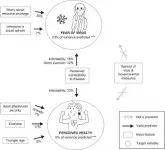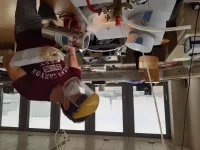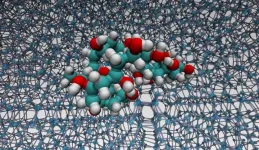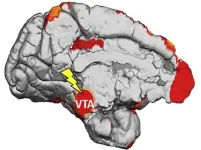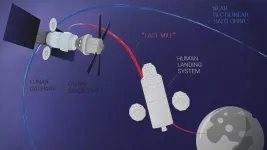Engineers combine AI and wearable cameras in self-walking robotic exoskeletons
2021-03-15
(Press-News.org) Robotics researchers are developing exoskeletons and prosthetic legs capable of thinking and making control decisions on their own using sophisticated artificial intelligence (AI) technology.
The system combines computer vision and deep-learning AI to mimic how able-bodied people walk by seeing their surroundings and adjusting their movements.
"We're giving robotic exoskeletons vision so they can control themselves," said Brokoslaw Laschowski, a PhD candidate in systems design engineering who leads a University of Waterloo research project called ExoNet.
Exoskeletons legs operated by motors already exist, but users must manually control them via smartphone applications or joysticks.
"That can be inconvenient and cognitively demanding," said Laschowski, also a student member of the Waterloo Artificial Intelligence Institute (Waterloo.ai). "Every time you want to perform a new locomotor activity, you have to stop, take out your smartphone and select the desired mode."
To address that limitation, the researchers fitted exoskeleton users with wearable cameras and are now optimizing AI computer software to process the video feed to accurately recognize stairs, doors and other features of the surrounding environment.
The next phase of the ExoNet research project will involve sending instructions to motors so that robotic exoskeletons can climb stairs, avoid obstacles or take other appropriate actions based on analysis of the user's current movement and the upcoming terrain.
"Our control approach wouldn't necessarily require human thought," said Laschowski, who is supervised by engineering professor John McPhee, the Canada Research Chair in Biomechatronic System Dynamics. "Similar to autonomous cars that drive themselves, we're designing autonomous exoskeletons and prosthetic legs that walk for themselves."
The researchers are also working to improve the energy efficiency of motors for robotic exoskeletons and prostheses by using human motion to self-charge the batteries.
INFORMATION:
The latest in a series of papers on the related projects, Simulation of Stand-to-Sit Biomechanics for Robotic Exoskeletons and Prostheses with Energy Regeneration, appears in the journal IEEE Transactions on Medical Robotics and Bionics.
The research team also includes engineering professor Alexander Wong, the Canada Research Chair in Artificial Intelligence and Medical Imaging, and William McNally, also a PhD candidate in systems design engineering and a student member of Waterloo.ai.
[Attachments] See images for this press release:
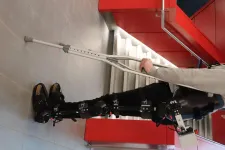
ELSE PRESS RELEASES FROM THIS DATE:
2021-03-15
In the first all-sky survey by the eROSITA X-ray telescope onboard SRG, astronomers at the Max Planck Institute for Extraterrestrial Physics have identified a previously unknown supernova remnant, dubbed "Hoinga". The finding was confirmed in archival radio data and marks the first discovery of a joint Australian-eROSITA partnership established to explore our Galaxy using multiple wavelengths, from low-frequency radio waves to energetic X-rays. The Hoinga supernova remnant is very large and located far from the galactic plane - a surprising first finding - implying that the next years might bring many more ...
2021-03-15
During pandemics, protective behaviors need to be motivated by effective communication. A critical factor in understanding a population's response to such a threat is the fear it elicits, since fear both contributes to motivating protective responses, but can also lead to panic-driven behaviors. Furthermore, lockdown measures affect well-being, making it important to identify protective factors that help to maintain high perceived levels of health during restrictions. An international team of researchers led by scientists from the University of Vienna has now identified psychological predictors of fear and health during the lockdowns. The result of the study, published in PLOS ONE: Individual psychological variables have a much better predictive power than environmental variables.
The ...
2021-03-15
We all have a clear picture in mind when we think of metals: We think of solid, unbreakable objects that conduct electricity and exhibit a typical metallic sheen. The behaviour of classical metals, for example their electrical conductivity, can be explained with well-known, well-tested physical theories.
But there are also more exotic metallic compounds that pose riddles: Some alloys are hard and brittle, special metal oxides can be transparent. There are even materials right at the border between metal and insulator: tiny changes in chemical composition turn the metal into an insulator - or vice versa. ...
2021-03-15
Cryoprotectants are used to protect biological material during frozen storage
They have to be removed when defrosting, and how much to use and how exactly they inhibit ice recrystallisation is poorly understood
The polymer poly(vinyl)alcohol (PVA) is arguably the most potent ice recrystallisation inhibitor and researchers from the University of Warwick have unravelled how exactly it works.
This newly acquired knowledge base provides novel guidelines to design the next generation of cryoprotectants
When biological material (cells, blood, tissues) is frozen, cryoprotectants are used to prevent the damage associated with the formation of ...
2021-03-15
Researchers uncovered for the first time what happens in animals' brains when they learn from subconscious, visual stimuli. In time, this knowledge can lead to new treatments for a number of conditions. The study, a collaboration between KU Leuven, Massachusetts General Hospital, and Harvard was published in Neuron.
An experienced birdwatcher recognises many more details in a bird's plumage than the ordinary person. Thanks to extensive training, he or she can identify specific features in the plumage. This learning process is not only dependent on conscious processes. Previous research has shown that when people are rewarded during the presentation of visual stimuli that are not consciously perceivable, ...
2021-03-15
Researchers from Skoltech and the Massachusetts Institute of Technology have analyzed several dozen options to pick the best one in terms of performance and costs for the 'last mile' of a future mission to the Moon - actually delivering astronauts to the lunar surface and back up to the safety of the orbiting lunar station. The paper was published in the journal Acta Astronautica.
Ever since December 1972, when the crew of Apollo 17 left the lunar surface, humans have been eager to return to the Moon. In 2017, the US government launched the Artemis program, which intends ...
2021-03-15
An RCSI study conducted in Beaumont Hospital in Dublin has found that surgery, rather than antibiotics-only, should remain as the mainstay of treatment for acute uncomplicated appendicitis.
Published in the Annals of Surgery and led by researchers from the RCSI University of Medicine and Health Sciences, the study entitled the COMMA trial (Conservative versus Open Management of Acute uncomplicated Appendicitis) examined the efficacy and quality of life associated with antibiotic-only treatment of acute uncomplicated appendicitis versus surgical intervention. The results revealed that antibiotic-only treatment resulted in high recurrence rates and an inferior quality ...
2021-03-15
Drugs such as beta-adrenergic antagonists (beta blockers) have been linked to a range of adverse effects, including depression. But how reliable are these data, and which psychiatric side effects might indeed be caused by these drugs? These questions have been addressed by a team of researchers from Charité - Universitätsmedizin Berlin, whose comprehensive meta-analysis has been published in Hypertension*. While treatment with beta blockers was not found to be associated with an increased incidence of depression, some studies recorded higher levels of sleep disturbance.
Beta-adrenergic ...
2021-03-15
During the past decade the European People's Party in the European Parliament was criticized for its unwillingness to vote for measures that would sanction the Hungarian Fidesz government, which is accused of breaching key democratic principles.
Researchers have said the EPP protected Fidesz in order to safeguard Hungarian votes in its ranks and protect their own interests, but this support had weakened by 2019, when Fidesz was suspended from the EPP.
Researchers analysed the votes of EPP MEPs for 24 resolutions covering the protection of EU fundamental values ...
2021-03-15
(Boston)-- Warning signs for Alzheimer's disease (AD) can begin in the brain years before the first symptoms appear. Spotting these clues may allow for lifestyle changes that could possibly delay the disease's destruction of the brain.
"Improving the diagnostic accuracy of Alzheimer's disease is an important clinical goal. If we are able to increase the diagnostic accuracy of the models in ways that can leverage existing data such as MRI scans, then that can be hugely beneficial," explained corresponding author Vijaya B. Kolachalama, PhD, assistant professor of medicine at Boston University School ...
LAST 30 PRESS RELEASES:
[Press-News.org] Engineers combine AI and wearable cameras in self-walking robotic exoskeletons


